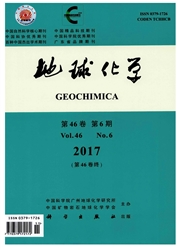

 中文摘要:
中文摘要:
系统探讨了黔中小流域水体悬浮物和沉积物中微量及稀土元素地球化学特征。结果表明, 元素含量在河流与湖泊、悬浮物与沉积物之间均存在明显差异。稀土元素北美页岩标准化分布模式大致为轻稀土相对富集的平坦模式, δEu为0.82~1.25, δCe为0.79~1.25, 整体变化不大, 均表现为弱异常。麦翁河稀土总量与分布模式均发生异常, 主要受上游盘龙煤矿影响。悬浮物的∑REE与pH呈反相关关系, 而沉积物的∑REE却与pH表现出正相关关系, 表明悬浮物与沉积物中稀土元素行为的控制因素不同。元素相关分析、因子分析及微量元素图解均表明悬浮物与沉积物中的元素具有同源性, 主要来源于流域岩石化学风化和土壤物理侵蚀的产物, 而某些金属元素Zn、Co、Cu、Cr、Ni则来源于周边工矿企业、农业生产等人为排放。本研究丰富和发展了喀斯特地区水体元素地球化学, 揭示了小流域化学风化与物理侵蚀过程中的元素特征和物质输送状况, 并为该流域的生态环境现状、治理及管理提供了科学依据和基础资料。
 英文摘要:
英文摘要:
The geochemical characteristics of trace elements and REEs in suspended matters and sediments were studied systematically in a small watershed of central Guizhou province. The results showed that the contents of REEs were significantly different between rivers and lakes, also between suspended and sediment phases. NASC-normalized REE distribution patterns were flat approximately to light REE enriched patterns, with slight anomalies for Eu and Ce (δEu=0.82~1.25, δCe=0.79~1.25). Concentrations and distribution patterns of REE in Maiweng River were unusual, due to the influence of Panlong coal mine upstream. ∑REE and pH revealed a negative correlation in suspended matters, while a positive correlation in sediments. This indicated suspended matters and sediments had different control factors. Correlation analysis, factor analysis and trace element diagrams demonstrated that these elements were originated from chemical weathering and soil physical erosion of watershed rock, while some heavy metal (such as Zn, Co, Cu, Cr and Ni) came from the anthropogenic sources of surrounding industrial, mining enterprises and agricultural activities. This contributes to the geochemistry of water elements in karst region, revealed the element characteristics and material conveying status in chemical weathering and physical erosion processes in the small watershed, also provided scientific basis and fundamental data for the ecological environment situation, governance and management.
 同期刊论文项目
同期刊论文项目
 同项目期刊论文
同项目期刊论文
 Isotopic indicators of source and fate of particulate organic carbon in a karstic watershed on the Y
Isotopic indicators of source and fate of particulate organic carbon in a karstic watershed on the Y Rare earth geochemistry in the dissolved, suspended and sedimentary loads in karstic rivers, Southwe
Rare earth geochemistry in the dissolved, suspended and sedimentary loads in karstic rivers, Southwe Sr fluxes and 87Sr/86Sr characterization of river waters from a karstic versus granitic watershed in
Sr fluxes and 87Sr/86Sr characterization of river waters from a karstic versus granitic watershed in 期刊信息
期刊信息
